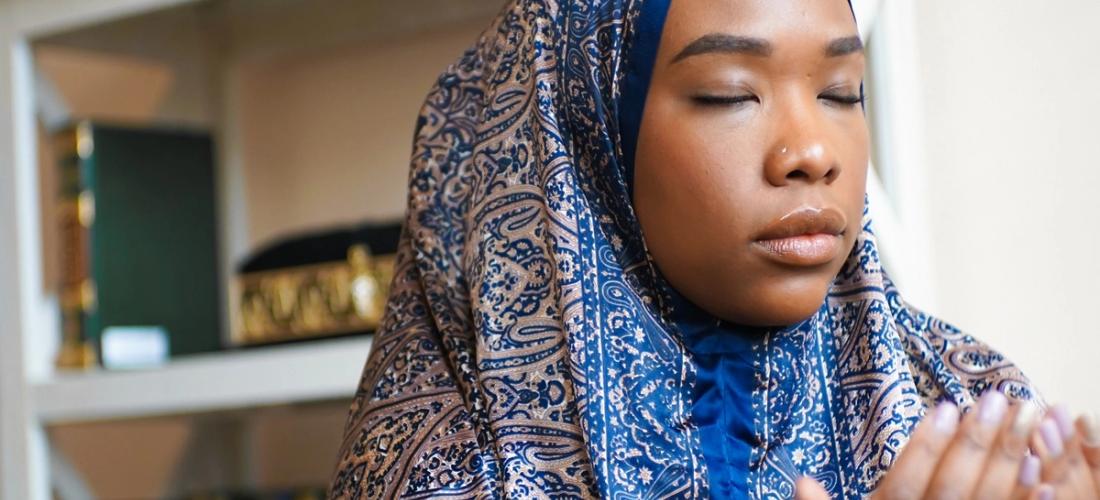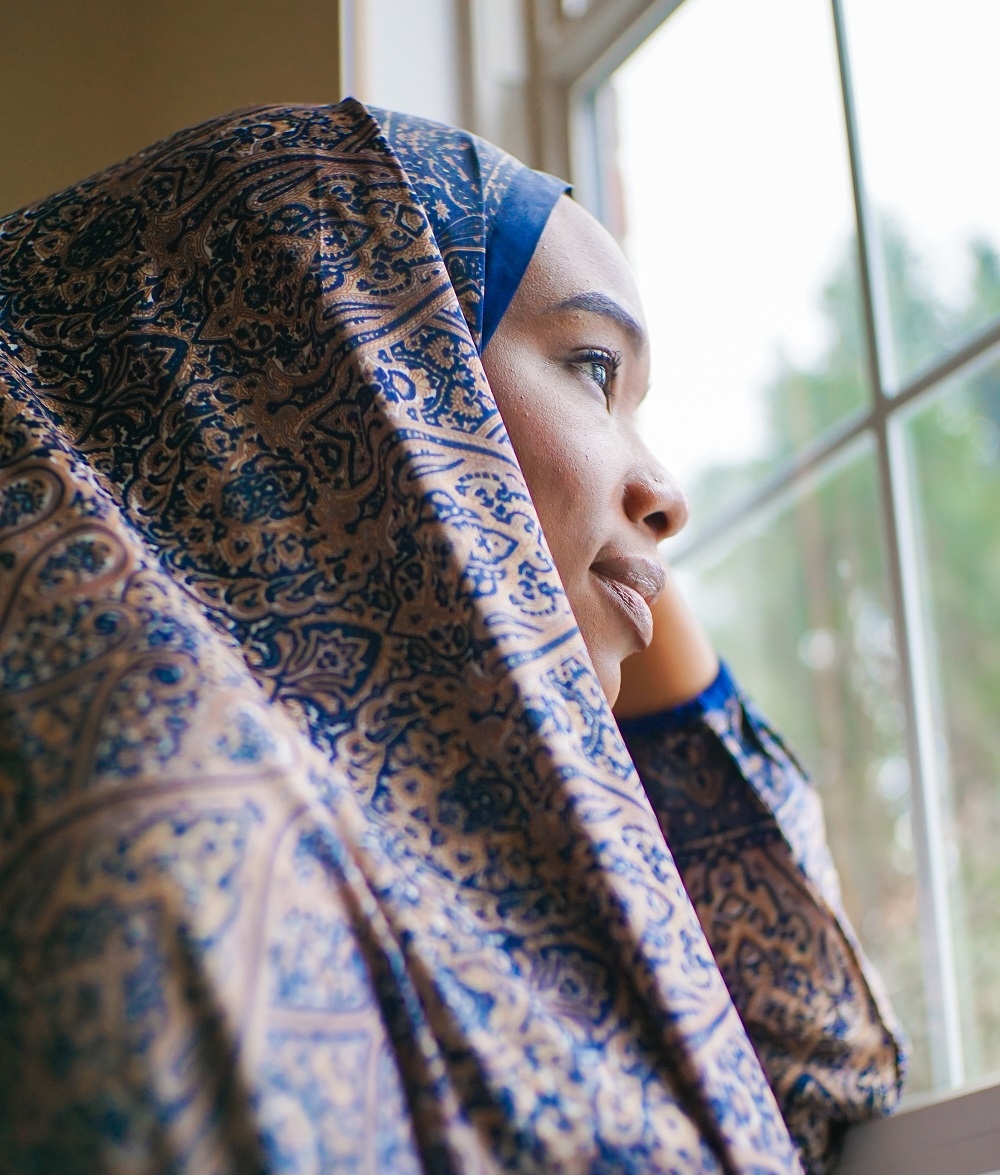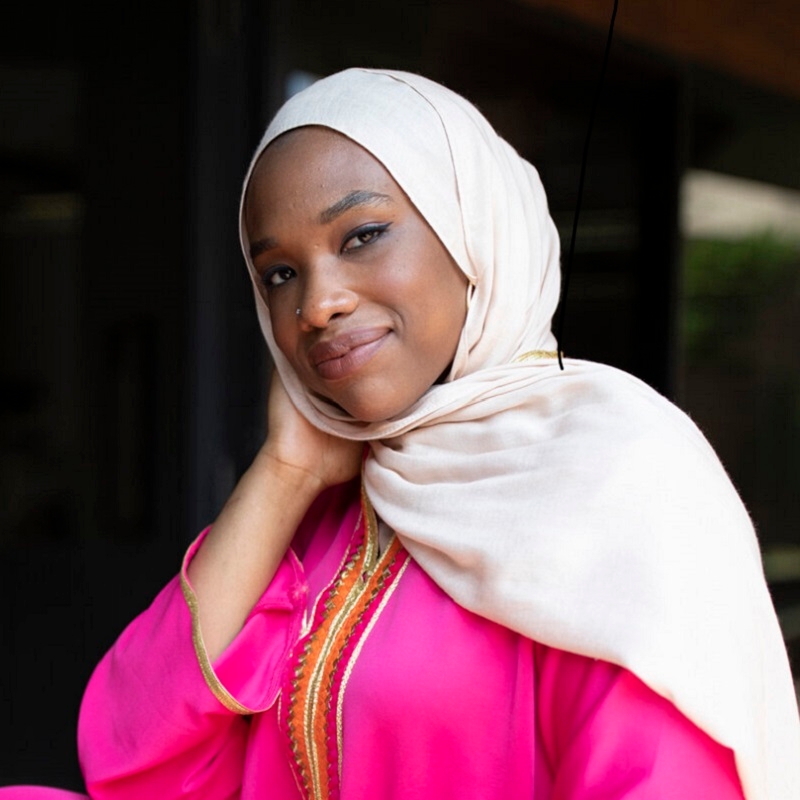We Have to Do Better in How We Talk About & Support Those Who Wear Hijab (or Want to)
Community
|
Sep 20, 2022
|
5 MIN READ

Hakeemah Cummings
The act of wearing hijab for Muslim woman is arguably one of the most hyper-scrutinized acts of worship in Islam. Everyone seems to have an opinion on it. Most acts of worship have an element of intimacy between the worshiper and God that cannot easily be accessed by a third party, rendering these acts of worship private and protected to public scrutiny. But not hijab.
Take fasting in the month of Ramadan as an example – no one knows whether a presumed fasting person is actually eating and drinking behind closed doors. If someone says they’re fasting, it’s generally assumed that person is fasting. Another important act of worship is the five daily prayers. Not many people have a vested interest in the prayers of fellow adults – keeping tabs on another’s prayers, asking others about what they said in the prayers, or demanding if they prayed correctly.
But hijab is treated differently. Hijabi women often complain of being bombarded with scrutiny about the manner in which they observe hijab. This scrutiny comes from so many sources, like family, strangers, men (so many men), women, the mosque, school, work and virtual spaces, to name a few. The shield of intimacy and privacy that other acts of worship are protected by are unveiled with hijab, and Muslim women often complain that their hijab seems to involve everyone else but her and God.
Hijab has become a measuring stick by which the community judges the faith of a woman, and ultimately, her value as Muslim. That public scrutiny is unfortunately often internalized by Muslim women, and we start to measure our own worth against how the public views our hijab as well.

The author, Hakeemah Cummings
Hijab-wearing Muslim women who converted to Islam as well as born Muslims often share in this plight. Once a woman converts, all too often one of the first things she is encouraged to do is to start observing hijab. And although wearing hijab is important, a balanced approach is vital so that she doesn’t see her value as a Muslim as solely in her ability to commit to hijab swiftly and with perfection.
(If you are thinking to wear hijab and are concerned that you’re not perfect in your salah or other fard (obligatory) acts of worship, you can still take it on, as discussed in this article.)
I wonder if men who convert to Islam are immediately reminded of their hijab obligations as well, just as swiftly as women converts are? Are they being told that they must immediately practice lowering their gaze, guarding their chastity, covering their aura, and fasting regularly to help control their sexual desires? Islam itself is balanced with these concepts, commanding both men and women to take measures to preserve their modesty. But too many Muslims are not practicing that balance.
Imagine if a girl was only complimented with “you’re so pretty!” her entire life. She never heard that she is brave, generous, important, limitless, intelligent, or confident, just that she is pretty. While it may be true that her looks are admirable, there are other things about her that also could have been praised. She grows up thinking that her value is only placed in her looks, and once her looks change due to weight fluctuations or health issues, for example, she deems that all her value is now lost because society doesn’t see her as pretty anymore.
We are doing the same thing to Muslim women with regards to hijab. The public places so much attention on the hijab that we are not valuing the all the ways we hold worth as Muslims. And then we blame Muslim women, even converts who are new to the entire Islamic lifestyle, for not being able to keep our hijabs on with the various fluctuations depressing or stressful challenges of life.
Of course the whole beautiful mission here at Haute Hijab, where I write for The Haute Take, is to empower Muslim women and make the hijab-wearing experience, which we take on for the sake of Allah (S), be filled with strength, beauty, faith, comfort, pride and more.

Hakeemah wearing an HH Bamboo Woven.
But, we also realize that while this is part of being visibly Muslim, wearing hijab is intensely private as well and can be a challenge for those of us who wear it. Sometimes changes in body image, relationships, work environments and other societal pressure often result in the discarding of hijab as well. This is not necessarily because the woman doesn’t believe in hijab anymore, but because the pressure to keep up the appearance of perfection or be a public representation of “all” Muslim women is overwhelming.
(Do you know someone who is struggling with hijab? We all probably do. Here are 22 women sharing what is hard for them and what they do about it. And read here for Melanie's take on why some women struggle with or remove their hijab.)
We have to do better.
One solution I propose to help foster this balance is to create safe spaces where women can be treated as whole human beings and not only hijabis versus non hijabis. We need these spaces for our children, teenagers and adult women, as well as convert and non-convert communities. We need our community leaders to address women in a balanced manner so that we are empowered to view ourselves as potential scholars of fiqh (Islamic jurisprudence), haafidhas (memorizers of Quran), qariahs (reciters of Quran), authors and beyond.
(Check out part one and part two of our interview with Ustadha Maryam Amir about her Qariah app, which brings women reciters of the Quran to your fingertips!)
Committing to hijab – whether we are new(er) to Islam or are a born-Muslim – then may become a part of the growth we experience as we try to increase our iman and get closer to Allah (S).
I speak with many convert women through my virtual hijab styling course, Hijab Styling 101 with Hakeemah. Every week, women from all walks of life come together to share our love of hijab, try different styles that work for us, share stories of strength and vulnerability, remind each other of the Islamic basis of hijab, and find sisterhood with one another in a judgment-free, safe environment. A gentle and supportive environment rather than a critical and blaming environment fosters a level of spiritual growth that is unmatched.
Convert women in the course share that by bonding with others in the hijab styling course, they found community and relatability when previously they felt alone. The environment empowers women to strive harder for their hijab while also giving themselves grace for their shortcomings.

Hakeemah reading Quran.
My advice to converts particularly as you navigate a new way of life is to do your best to find communities that uplift you and do not overwhelm you. Allah (S) wants ease for us and doesn’t want hardship for us. But, He also will not give you a trial that is heavier than you can bear. Privatize your acts of worship and consult with God first and above anyone else to help you to commit and improve those acts.
Prayer, fasting, character building, giving charity, reading and studying the Quran are matters that need attention just as much (if not more) as hijab, and can make committing to hijab easier on you. Remember that Allah (S) is merciful, forgiving and your ultimate guide. Trust in Him, consult with Him, and know that when you take even one step towards Him, He comes to you running.
Subscribe to be the first to know about new product releases, styling ideas and more.
What products are you interested in?

